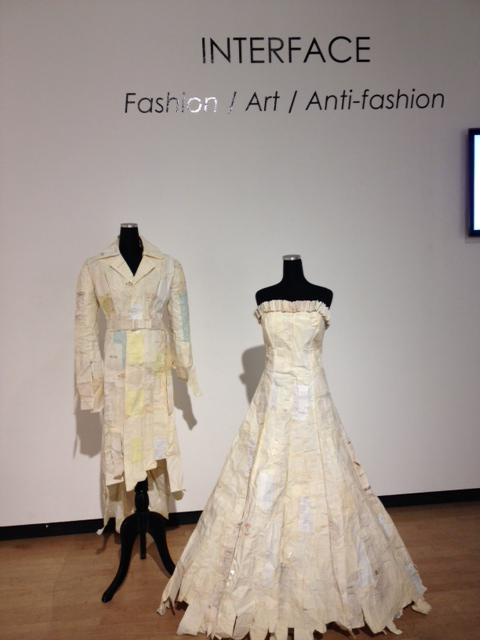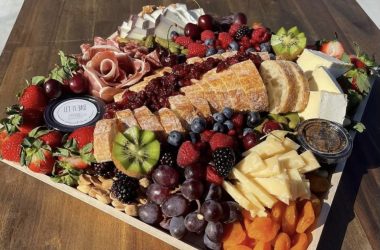The Max L. Gatov West and East galleries are draped with floor length, hand-knitted fashion pieces, including garments made entirely of receipts for this week’s exhibit: “The Clothed Body,” an exhibit curated by Karen Kleinfelder’s art history students.
Amabelle Aguiluz, one of the designers that contributed to “The Clothed Body,” features a number of cultural art pieces integrated in a fashion theme with the message of “Interface.” She said that by evolving the definition of the term to cultural works of art, “Interface” challenges the general opinion on the definition of fashion.
“We are interested in how art uses fashion, how fashion uses art, and how anti-fashion operates subversively within both realms,” Aguiluz’s artist’s statement said.
Although Aguiluz is a graduate from the Fashion Institute of Technology in New York, and she gladly agreed to feature a few pieces from her most recent collection when the gallery coordinators for this event invited her to be a part of the collaborative exhibit.
The exhibit included high fashion portraits featuring strong, middle-aged women, a dress and coat made entirely of receipts and knit fashion wear that was more than eight feet long, hanging from the ceiling and spiraling down to the floor.
For the exhibit, two of her most contrasting pieces were showcased while a video loop of a recent runway show played, displaying the rest of her collection.
This year, Aguiluz showed her collection for the first time at LA Fashion week, one of the premier spotlights for both aspiring and established fashion designers.
The intricacies in Aguiluz’s designs are shown in her attention to detail, with every cut and stitch thought out. Aguiluz said she created the pieces with the idea of versatility in mind. She said her pieces are meant to be transformative, functional and sustainable.
Aguiluz’s advertises her designs as “handmade, organic, sustainable, recycled, fair trade and made in LA.”
She said she began knitting her collection intuitively a little more than a year ago and that her designs eventually formed into a full 13-piece collection, which she showed at LA Fashion Week in October.
The pieces took roughly a year to make, Aguiluz said. Her design aesthetic is to create handmade, detail-oriented pieces that can be worn in a variety of different ways.
One of Aguiluz’s pieces, “the capture vest,” is a hand-knit piece with detailed cut-outs that could be worn in a number of ways. “The capture vest” was also shown as being worn in four to five other ways, including as a skirt.
Aguiluz wanted to show fluidity through her designs, likening her pieces to works of art. She explained that this exhibit was important, showing the connection between cultural art and fashion.
According to Aguiluz, inspiration for her collection was derived from the fluidity in nature, a Japanese essay titled “In Praise of Shadows,” and music from composers like “Phillip Glass.”
“I used materials that are all organic, fair trade and I made everything myself,” Aguiluz said. “That’s part of the whole mission behind what I’m doing as a designer and as an artist.”
To view previous collections and future previews of Aguiluz’s designs, visit www.amabelleaguiluz.com. The exhibit will be on display in the student fine art galleries through Thursday.




